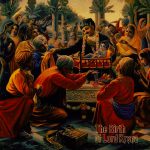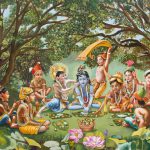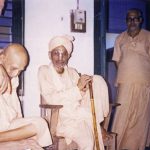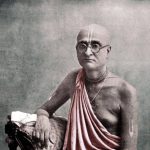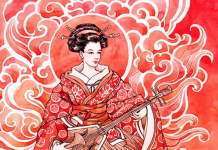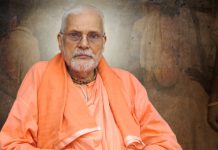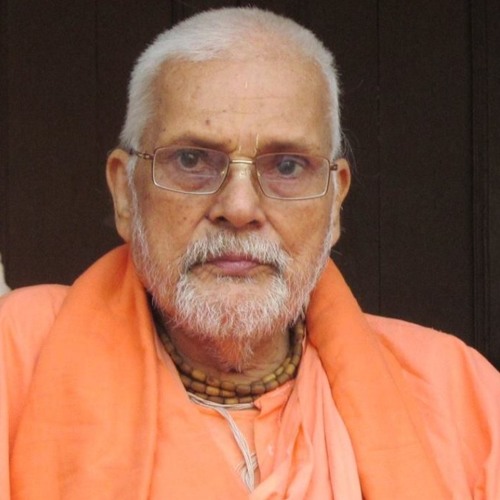 by Pujapad Srila Bhaktivijnana Bharati Maharaja
by Pujapad Srila Bhaktivijnana Bharati Maharaja
Once when Guru Mahārāja (Śrī Śrīmad Bhakti Dayita Mādhava Gosvāmī Mahārāja) was present in Vṛndāvana during his appearance day festival, he sang the following kīrtana written by Śrīla Bhaktivinoda Ṭhākura:
āmāra jīvana, sadā pāpe rata,
nāhikô puṇyera leśa
parere udvega, diyāchi ĵe katô,
diyāchi jīvere kleśa
Śaraṇāgati (1.4.1)
My life is perpetually dedicated to sin; thus I am without a trace of piety. I have given others great anxiety and brought only misery to living beings. *
His melodious voice was so heart-warming that all the assembled devotees began to cry.
After performing this kīrtana, he addressed the audience. “Today is Utthāna Ekādaśī, the day when the Lord wakes up after resting for four months. It is also the disappearance day of my parama-gurudeva, Śrī Śrīmad Gaura-kiśora dāsa Bābājī Mahārāja. Others devotees have already spoken at length about Śrīla Bābājī Mahārāja’s glories today, so I am taking this opportunity now to pray to my parama-gurudeva that I may become the recipient of his mercy and the mercy of his dearest disciple, my most worshipful Guru Mahārāja, Śrī Śrīmad Bhaktisiddhānta Sarasvatī Ṭhākura Prabhupāda. It just so happened that on this day in 1903, I was born in the Kāñcanapāḍā village of the Faridpūra district of what is now East Pakistan[1].
“We find in the description of the birth ceremonies of Śrī Rāmacandra, Śrī Kṛṣṇa, Śrīmatī Rādhikā, and Śrī Caitanya Mahāprabhu how Śrī Daśaratha Mahārāja, Śrī Nanda Bābā, Śrī Vṛṣabhānu Mahārāja, Śrī Jagannātha Miśra, respectively, served the deity of the Lord, the brāhmaṇas, their relatives and all living entities by offering edibles, cows, ornaments, sweets, donations and many other items. Additionally, they taught their children that on one’s birthday, it is one’s duty to beg for the mercy of their elders, touch their feet, pray to them and listen to them narrate their experiences.
“Even today, this Vedic etiquette is followed mostly everywhere in India. My mother taught me early on how one ought to observe one’s birthday. She used to say that on the day of his birth, a person is put into the prison of a gross and a subtle body to suffer his past karma. This suffering is reduced or increased according to his conduct. Conditioned souls should not view their birthday as an opportunity to happily contemplate the number of years they have been shackled in the prison of their gross and subtle bodies. Rather, they should use this day as an opportunity to serve and pray for release from this world, or at least pray in a repentant way for the ability to tolerate the suffering they experience here. They should be joyous only if they receive an opportunity to serve Śrī Hari on that day. Liberated souls, on the other hand, are naturally joyous on the day of their birth, because for them it is a chance to celebrate and remember the years they have served their worshipful Lord in this world. They have not come here to suffer the reactions of karma; rather, their only objective in this world is to deliver the conditioned souls from the darkness of ignorance by illuminating the spiritual path with the torchlight of knowledge. For this work, Bhagavān provides them with the salary of prema.”
“On this day, the day of my birth, it is my duty to worship śrī guru. For me, śrī guru manifests in four ways. The first is the one who destroys my ignorgance. Since Bhagavān is the source of unlimited knowledge, he is the root of guru-tattva, and thus appears in the form of caitya-guru. Therefore, it is my duty to worship Him today. The second manifestation of śrī guru is Śrīla Prabhupāda, the founder of the Śrī Caitanya Maṭhas and Gauḍīya Maṭhas established worldwide, who personally engaged me in the service of the Lord and thereby gave my life meaning. Thirdly, I consider the Vaiṣṇavas, especially the disciples of Śrīla Prabhupāda, as individual manifestations of śrī guru, for they increase my remembrance of the conduct, instructions, teachings and heartfelt desires of Śrīla Prabhupāda.
“Fourthly, I consider my disciples as my gurus, because by always surrounding me, residing with me and expecting me to be a model of proper conduct, they force me to behave properly and also cause me to deeply reflect on my every action. I will never benefit by associating with someone who offers me praise and flattery. Giving up such association, I will always keep the company of those who instruct me by pointing out my misktakes.
“Since I consider my disciples as my gurus, it is my natural inclination to serve them. I am not a fool that I will sit on an elevated seat and accept the worship of my worshipful objects for my own sake. If I were to do this, there would be no pūjā. Instead, when I see that my gurus have a desire to worship me on the day of my birth, I am obliged by affection to serve them by accepting such adoration, for they are my worshipful objects, and it is my duty to serve them by abiding by their wishes. In this way, there is no difference between worship and blessings. By offering me worship, they bless me that I may serve them by pleasing them through the medium of accepting that worship. By performing kīrtana before me, they provide me with the opportunity to serve them by performing śravaṇa (hearing).
“Although my disciples are my gurus, my great affection for them sometimes forces me to instruct and chastise them in the same way that Nanda Bābā and Yaśodā Maiyā are seen to chastise, punish, instruct and even bind the Supreme Lord Śrī Kṛṣṇa. Because of their deep affection, their mood of submissiveness to the Lord is eclipsed by their mood of being His loving father and mother. From one perspective, guru is an authority figure, and from another he is his disciple’s closest friend and well-wisher. The concepts of being the protector and the protected are simultaneously present in the pure devotees of the Lord. Sometimes, according to need, the influence of one of these moods is seen to dominate the other, and sometimes the other is seen to be dominant. In this way, there is no fault if out of deep affection the servant is seen to chastise or instruct the object of service. Today, a strong mood of being the protected has arisen in me, as you are all protecting me by bestowing your most merciful blessings upon me.
“We personally witnessed the manner in which Śrīla Prabhupāda observed his appearance day by offering his gratitude and service to the Vaiṣṇavas. Today, I will take this opportunity to serve you all and express my gratitude for continuously showering your blessings upon me. Those who worshipped me today should know that in reality, they have worshipped my gurudeva, who is the real object of worship for the whole world. Service to śrī guru is as good a service to Bhagavān.”
At that time, Guru Mahārāja personally offered daṇḍavat-praṇāma, sandalwood paste, garlands, clothes and donations first to all his godbrothers present there, and then to all the paṇḍās (brāhmaṇa priests). When someone would say, “Today is your appearance day, please be merciful to me,” Guru Mahārāja would reply, “I do not pay attention to whether it is my birthday or some other day. Even so, it is one’s duty to serve sādhus on one’s birthday, and I do not want to pass up a single opportunity to serve the Vaiṣṇavas while I am still consciously aware. I am therefore using my birthday as an excuse to perform vaiṣṇava-sevā. Because Vaiṣṇavas do not wish to accept anything for themselves, they should be served on some pretext.” It was Guru Mahārāja’s specialty that he would invite and offer respect to even the Gosāis, who were principally against the Gauḍīya Maṭha, and give them the opportunity to listen to the pure, unadulterated teachings of the Gauḍīya Maṭha.
Guru Mahārāja would tell us, “Vaiṣṇavas are our worshipful deities. We must offer them daṇḍavat-praṇāma along with any offerings we may give them. We have learned this etiquette from observing the conduct of Śrīla Prabhupāda. Some of the Vaiṣṇavas present here, especially the disciples of my godbrothers, are like my disciples, and so they will hesitate to accept anything from me if I have to offer them praṇāma. Therefore, you should offer them all these items, just as I have offered them to my godbrothers—with respect and proper etiquette. Some Vaiṣṇavas have come from far-away places, like Nandagrāma, Govardhana, Kāmāi, Karehlā, Kiśorī-kuṇḍa and so on, and have spent a great deal of money to travel here. Offer them donations in such a way that some money remains after their travel expenses have been covered. Never be a miser in the service of Vaiṣṇavas.”
From ‘VOLCANIC ENERGY: Lessons from the Life of Śrī Śrīmad Bhakti Dayita Mādhava Gosvāmī Mahārāja.’



